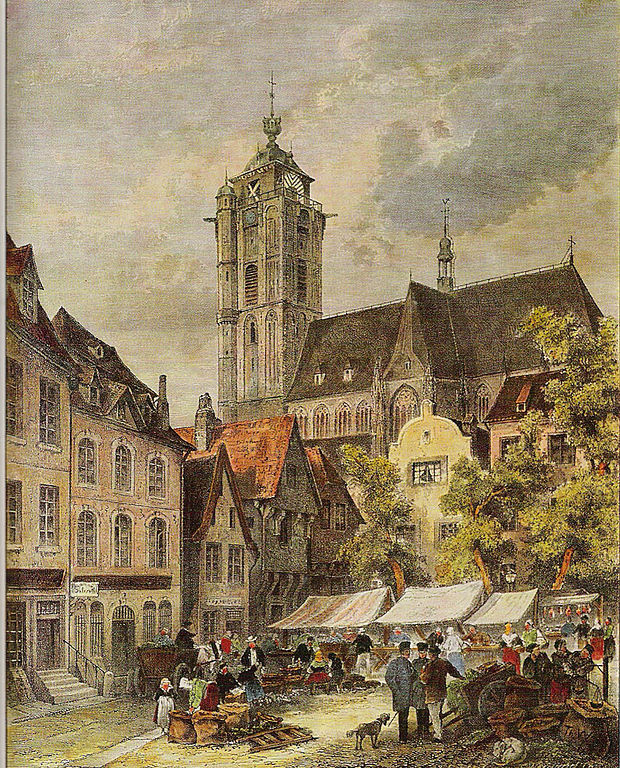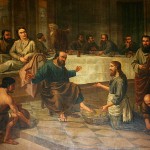I am writing a series of columns on Catholic social doctrine. Here’s all of them.
–
A possibly apocryphal story holds that, during a state visit to San Francicso, the Soviet Premier Nikita Kruschev was so impressed by the abundance of goods in the city’s stores that he asked to meet the person in charge of supplying them. Today this story makes us smile, but the answer to the Communist leader’s question—no one, and it works much better that way—is actually deeply counter-intuitive.
Nowadays almost nobody questions that markets and private business have some role to play in any just economic system. And yet it is not at all obvious why it should be so. In the 19th century, a very commonly heard argument for collectivism was the idea that competition is wasteful. And isn’t it? If dozens of companies can make good-ish cars, just imagine if they could pool all their resources—their R&D departments, their manufacturing capabilities, and so on. And imagine how much cheaper the cars would be if car manufacturers didn’t have to turn a profit, or spend money on marketing. Again, today we immediately recognize this thinking as preposterous but it is only because of our historical background that we think this is “common sense.” In fact, market thinking runs deeply contrary to common sense.
The way markets work is deeply mysterious. As Leonard Reed’s economic parable I, Pencil, made popular by Milton Friedman, tells, no single person is capable of making a pencil : to make a humble pencil, you need people to cut wood (who need people to make steel to make the saw to cut down the tree), people to mine graphite, people to ship those raw materials, and so on. To make a simple pencil, literally thousands of people all over the world, most of whom have never met and don’t even know of each other, have to cooperate. And they do this seemingly without any coordination. How do they do this? Before ready-made answers pop into your brain, take a moment to ponder the sheer implausibility to our common sense that any pencil should ever get manufactured in this way.
If it’s baffling that markets should work at all, how baffling is it that they (at least, on the whole, in most cases, etc.) work better than when an intelligent planner is at work? And not just marginally better—as the quasi-natural experiments of West vs. East Germany and South vs. North Korea show, markets are stupendously better than central planning—even though, if we are honest, our intuition screams that it should be the other way around.
The best fundamental explanation that I know of was given by F.A. Hayek in his 1945 essay, The Use of Knowledge in Society. The fundamental reason why markets work is not, say, the motivational virtues of the profit motive or of healthy competition. The fundamental reason why markets work is, quite simply, that human beings are not very good at receiving and processing information. Any given individual only knows a fraction of all that is known collectively—crucially, this very much includes any central planner. Because information is dispersed throughout the society, a decentralized system of production is able to incorporate more information and therefore make more judicious decisions. And markets, through the operation of the price system, allow us to aggregate and transmit information much more effectively—or much less ineffectively—than we otherwise could.
In other words, markets work because they take into account the fundamental limitedness of human beings. Thus, the link between market thinking and Christian theology becomes obvious : the most noteworthy thing about man-in-the-world, according to Scripture, is our sinful nature. The world we inhabit, which is falling, is under a curse, ourselves included. Any theology of human endeavor that does not put original sin at the center is doomed to fail—and is not Catholic.
Markets, then, “work” because they are the mode of organization that is most in accord with our nature—that is to say, they function because and through our limitedness. Paradoxically, this also helps us understand why markets are so counter-intuitive. For what is the cause and consequence of original sin? Pride. To advocate central planning is, firstly, to believe that it is possible—that is to say, to believe that it’s possible for a human, or a group of humans, to have all the information necessary to ensure human flourishing. When one thinks of it, one is struck by the hubris of it. But, what is more hubristic than man?
To summarize : Christian social doctrine is for fallen world and man ; if it is for this fallen world, for fallen man, then the thing it must start from is original sin. This awareness of man’s original sin naturally leads to a skepticism for centralization and central planning, and a bias towards, not just towards subsidiarity, but also free markets, even as this knowledge of original sin assures us that no system, including free markets, can be perfect or above evangelical critique.














